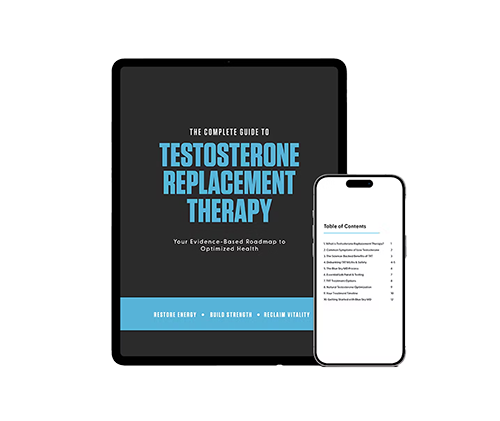Many men will begin to notice a decline in muscle, weight gain, loss of libido, or a general lack of energy by their early thirties. These symptoms can all be an indication of low testosterone.
Testosterone replacement therapy ( also known as TRT) is by now a very well-known treatment for addressing low testosterone symptoms in men and TRT clinics like ours that offer both traditional TRT and bioidentical-hormone-replacement-therapy options have become easier to find.
What Are the Lesser-Known Benefits of Testosterone Replacement Therapy?
TRT is probably known best for its ability to increase strength and muscle mass, but one of the most positive benefits our patients notice right away is increased mental clarity, skeletal strength, mood regulation, cardiovascular health, and an increase in overall energy levels.
These additional benefits are often overlooked during standard primary care consultations, yet they are in some ways even more critical for our well-being than muscle growth from a purely scientific standpoint.
1. TRT Can Improve Cognitive Function and Mental Clarity
TRT can enhance cognitive speed and memory retention by improving neuronal function. Optimized testosterone levels can support increased synaptic density in brain regions responsible for learning and spatial memory.
For instance, men undergoing TRT often report faster memory recall and clearer thinking, which can help counteract age-related declines.
2. TRT Enhances Bone Density and Strength
TRT stimulates bone remodeling by boosting osteoblast activity, which increases bone mineral density and reduces osteoporosis risk. Clinical trials have shown that TRT can raise bone density by 5–7% in a year, leading to improved posture, fewer fractures, and less joint pain.
3. TRT Can Help Regulate Mood and Reduces Anxiety or Depression
Testosterone plays a key role in mood regulation through its effects on the hypothalamus and limbic system, and thereby may improve depression symptoms. TRT has been linked to lower cortisol levels and reduced anxiety. Additionally, many patients experience up to a 20% improvement in mood stabilization, which can lead to a more positive outlook and better social well-being.
4. TRT May Support Cardiovascular Health
By influencing the lipid profile and reducing arterial stiffness, TRT may protect cardiovascular health. Optimized testosterone levels help lower low-density lipoproteins (LDL) and raise high-density lipoproteins (HDL). This, along with reduced inflammatory markers, supports blood vessel integrity and may lower the risk of atherosclerosis.
5. TRT Can Increase Energy Levels and Reduce Fatigue
Many men on TRT report increased physical and mental energy. This boost is linked to improved mitochondrial efficiency and protein synthesis, which together enhance stamina and reduce fatigue. Such energy improvements enable better engagement in strength training and endurance activities.
Who Can Benefit Most From These Unexpected TRT Advantages?
Not all individuals experience the same benefits from TRT. Men with specific symptoms, health histories, or age-related declines often see more pronounced improvements when the therapy is personalized.
Symptoms such as chronic fatigue, diminished cognitive function, unexplained mood swings, lower bone density, and reduced muscle mass may signal a need for TRT. Men who struggle with physical performance during exercise might also notice marked improvements after starting therapy.
How Is Eligibility for TRT Determined?
In addition to measuring testosterone levels through blood tests, healthcare providers assess quality of life indicators like symptom checklists, bone density scans, orcognitive assessments, to make sure the TRT is tailored to each patient’s individual physical and mental health needs.
Are There Specific Age Groups or Conditions That See Greater Benefits?
Men between 40 and 60 typically experience the most dramatic improvements when it comes to cognitive function and bone density. Patients with conditions such as early-onset osteoporosis, mild cognitive impairment, and metabolic syndrome can also benefit significantly.
Those engaged in regular fitness or recovering from injuries may experience faster muscle repair and reduced recovery times.
What Side Effects Should Patients Watch for During TRT?
Common side effects include mild acne, a temporary increase in red blood cell counts (polycythemia), mood fluctuations, fluid retention, or minor breast tenderness. Prompt reporting of any unexpected changes allows for timely intervention and dosage adjustments from your provider.
How Do Risks Compare to the Benefits in Long-Term TRT Therapy?
With proper monitoring, the long-term benefits (improved cognitive function, enhanced muscle mass, and cardiovascular protection) often outweigh the risks. Studies suggest that when therapy is personalized and well-supervised, TRT is safe for most patients.
Get Personalized TRT from a trusted local provider like Blue Sky MD
TRT offers a broad spectrum of benefits beyond increased energy and sexual function. However, personalized treatments and comprehensive care are the keys to maximizing TRT benefits while minimizing risks. You should consult with a provider who specializes in hormone replacement therapy in order to get personalized and safe therapy.




